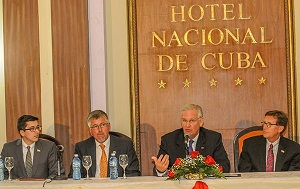 Speaking in Havana, May 31, Missouri Governor Jeremiah Nixon highlighted that Cuba represents great business opportunities for the midwestern U.S. state.
Speaking in Havana, May 31, Missouri Governor Jeremiah Nixon highlighted that Cuba represents great business opportunities for the midwestern U.S. state.
Nixon – the fifth U.S. governor to visit the island since Presidents Raúl Castro and Barack Obama opened a new chapter bilateral relations on December 17, 2014 – noted that Cubans consume many products produced in the state.
Missouri is a global leader in the production of rice, soy, chicken and other agricultural products which Cuba imports in large quantities to supply its domestic market, and growing demand from the tourism sector.
After emphasizing the geographical advantage of shipping between Cuba and the U.S., as both the Missouri and Mississippi rivers are navigable and flow into the Gulf of Mexico, only a few hundred miles from Cuba; the Governor also highlighted the world class quality and competitive prices of products from Missouri.
However, the existence of the blockade and specific regulations linked to agriculture continue to impede trade between the two countries.
Despite the fact that the Trade Sanctions Reform and Export Enhancement Act of 2000 opened up opportunities for U.S. businesses to sell food products to Cuba, transactions must still be carried out under harsh terms, such as the requirement that Cuba pay in cash, in advance.
Although sales of U.S. agricultural products to the island reached some $710 million dollars in 2008, this figure has been declining over recent years due to Cuba’s difficulty in obtaining credits and better trading conditions in other markets.
It is a contradiction therefore that one of the leading trade sectors between the two countries finds itself at a disadvantage in the new bilateral situation.
Thus, many food producing states are pressuring the U.S. government for change. Last year the U.S. Agriculture Coalition for Cuba (USACC) was founded, while various bills which would lift a good portion of current sanctions, are currently making their way through Congress.
Nixon noted his confidence in a changing scenario, stating that the difference between where we were a few years ago, and where we are now, makes him believe that the remaining problems can be resolved.
In addition to sales of agricultural products to Cuba, the governor also highlighted opportunities for the transfer of technology which could benefit Cuban farmers.
He also highlighted the country’s highly trained workforce and its advances in the field of medicine. Nixon added that Missouri has historically imported nickel from the island, while also noting the attraction of tourism given Cuba’s proximity, only 90 miles away.
The Missouri governor who led a delegation of almost 20 business representatives, held meetings with Ricardo Cabrisas, a Council of Ministers Vice President, as well as ministers of Agriculture and Foreign Trade and Investment, Gustavo Rodríguez Rollero and Rodrigo Malmierca, respectively.
Nixon presented Cuban authorities with a 20 ton donation of rice – as a gesture of the state’s interest in expanding economic ties – from the Martin Rice company, one of the entities participating in a bilateral business forum which took place May 31, in Havana’s Hotel Nacional.
BUSINESS FORUM
During the bilateral business forum Jeremiah Nixon noted that Cuba represents a great opportunity for Missouri producers, as Cubans consume key products produced in the state, such as milk based products, soy, rice and beef.
According to ACN, María de la Luz B’Hamel, director of Trade Policy for North America at the Cuba Ministry of Foreign Trade and Investment (Mincex), recalled that since the reestablishment of diplomatic relations between Havana and Washington, and the beginning of a process moving toward normalization of relations, meetings have taken place at all levels, during which both parties have repeatedly expressed their willingness to advance in this direction.
We appreciate the trade achieved thus far, stated B’Hamel, but it is insufficient given the interest and opportunities which exist, and the continued application of the economic, commercial and financial blockade imposed by the United States on Cuba.
She added that executive measures announced by the U.S. Departments of the Treasury and Commerce are inadequate, and that those of greater reach have yet to be implemented, such as authorizing Cuba’s use of the dollar in international transactions.
The Mincex representative recalled that the U.S. agro-industrial sector played an important role in getting the Trade Sanctions Reform and Export Enhancement Act of 2000 passed.
We are sure that today, that same energy will be extended to efforts to lift the blockade which imposes harsh conditions on Cuba when purchasing U.S. agricultural products, she highlighted.